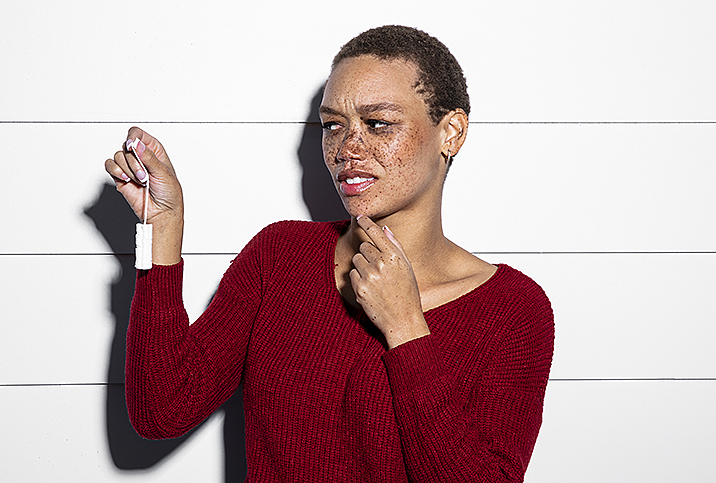The History of Douching, and Why You Really Shouldn't

Douching is when water and other products such as vinegar, baking soda or iodine are sprayed up into the vagina for the sake of "cleaning" it. While doctors have maintained the practice of cleaning your vagina is unnecessary and harmful, the myth persists. In fact, as many as 1 in 5 American women between the ages of 15 and 44 still use a vaginal douche.
When and why did douching start?
Evidence of douching dates back as far as the ancient world but didn't become mainstream in the United States until somewhere around the 1920s. Back then, it was said it prevented pregnancy (even though it didn't and still doesn't) and assisted with a woman's "feminine hygiene." One of the first major brands to sell a douche to keep women "clean" was Lysol. That's right—those chemicals used to disinfect our kitchen counters and bathrooms were once squirted up lady parts everywhere (talk about "burning sensation").
By 1911, 11 women were poisoned (five of whom died) from "uterine irrigations" sold by Lysol. Controversy surrounding vaginal douching increased, and yet the practice became the norm in American society. Even though most doctors didn't even recommend the practice then, the surge of unhealthily "washing out" the vagina through douching remains relatively common in our culture, even today (hopefully, sans Lysol).
Despite the fact the majority of doctors warn against the use of douches, scented period products, deodorant sprays and special soaps, market research published by Technavio in 2018 reported they're expecting the "vaginal odor" industry to grow by 5 percent each year until 2023.
So, why do some women still practice douching?
A 2014 study published by Environmental Health Perspectives hypothesized that the reason could be linked to education and culture, considering that most women who douche learned it from their mother. The reality is it's probably a mixture of things in our society leading to some women still douching. Things like a lack of proper sexual education, culture or simply being inundated with advertising for "vaginal health" products are likely all partially to blame.
Today, most women douche for hygiene purposes, which is ironic considering vaginal douching has been found to put you at higher risk for vaginal infections, according to a 2020 study.
The problem with douching
Nearly all medical professionals agree douching does more harm than good. Douching negatively impacts the natural balance of bacteria present in your vagina, leading to infections and other complications.
Common issues associated with douching include the following:
Pelvic inflammatory disease
If you already have an infection of some kind (which could be the case if you're douching because of an "odor problem"), then douching has the potential to push the bacteria from the infection into your uterus, fallopian tubes and ovaries. This can cause pelvic inflammatory disease (PID). PID causes chronic pain in the pelvic area and scarring in the reproductive organs that can make it harder to get pregnant if you decide to do so.
Fertility issues
By possibly damaging your fallopian tubes, it may become more likely a fertilized egg could attach in the tubes, resulting in an ectopic pregnancy. Women who douche during pregnancy are more likely to give birth prematurely, according to a 2007 study by the American Journal of Obstetrics and Gynecology.
Ovarian cancer
A 2017 study published by PubMed Central found an increased risk for ovarian cancer in women who douche. While the correlation isn't totally understood, researchers think the increase in risk is associated with phthalates (chemicals used to make plastics flexible in lubricants and fragrances) being introduced into the system through douching. Phthalates are known to disrupt hormones and cause infection.
So, what is the best way to clean your vagina?
Vaginas are self-cleaning. Through vaginal discharge, the vagina "washes itself" and keeps itself properly lubricated. While vaginal discharge can be a hassle, it's the body's way of cleaning out leftover blood and semen. It also sheds old cells and keeps the bacteria in your vagina at healthy levels to prevent infection.
The best way to clean your vagina is not to. To clean your outer labia, merely use warm water in the shower (if you insist on using soap, opt for an unscented, gentle soap). Then rinse your inner labia with just warm water to prevent irritation. Gently pat your vulva with a towel to dry.
Remember, your vagina isn't supposed to smell like flowers
You might get self-conscious about the way your lady parts smell from time to time, but douching is not the answer. Douching may take away the odor, but only temporarily. Long-term, douching will make the problem worse by disrupting the natural pH and bacteria levels in your vagina.
A healthy vagina is meant to have a mild odor that can change throughout the day and even become "musky" when sweaty. However, if the odor is more intense than normal, make an appointment with your gynecologist as this could be a sign of infection.
For recurring yeast infections, your doctor may prescribe boric acid suppositories, especially for yeast infections resistant to antifungal medications. Depending on the severity of the infection, your doctor may prescribe a standard treatment followed by boric acid suppositories. It's always best to seek your gynecologist's advice on the best treatment for each individual infection.


















